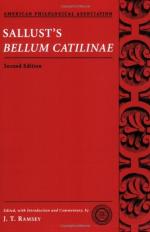|
This section contains 14,250 words (approx. 48 pages at 300 words per page) |

|
SOURCE: Levene, D. S. “Sallusts's Jugurtha: An ‘Historical Fragment.’” Journal of Roman Studies 82 (1992): 53-70.
In the following essay, Levene argues that Sallust deliberately composed his Bellum Jugurthinum as a fragment in order to highlight the moral decline and tragedy of Rome and to show that the history he writes is incomplete.
The ancient historian is used to dealing with texts that are fragments through the accident of transmission. This paper is concerned with a deliberate fragment: a work that is notionally complete, in that it is written and presented as something finished and whole, but which at the same time draws the reader's attention in a more or less systematic fashion to the fact that it is incomplete; it shows itself to be only part of the whole. The mode was especially popular in the Romantic period; the best-known example for English readers in Coleridge's Kubla Khan, but...
|
This section contains 14,250 words (approx. 48 pages at 300 words per page) |

|


